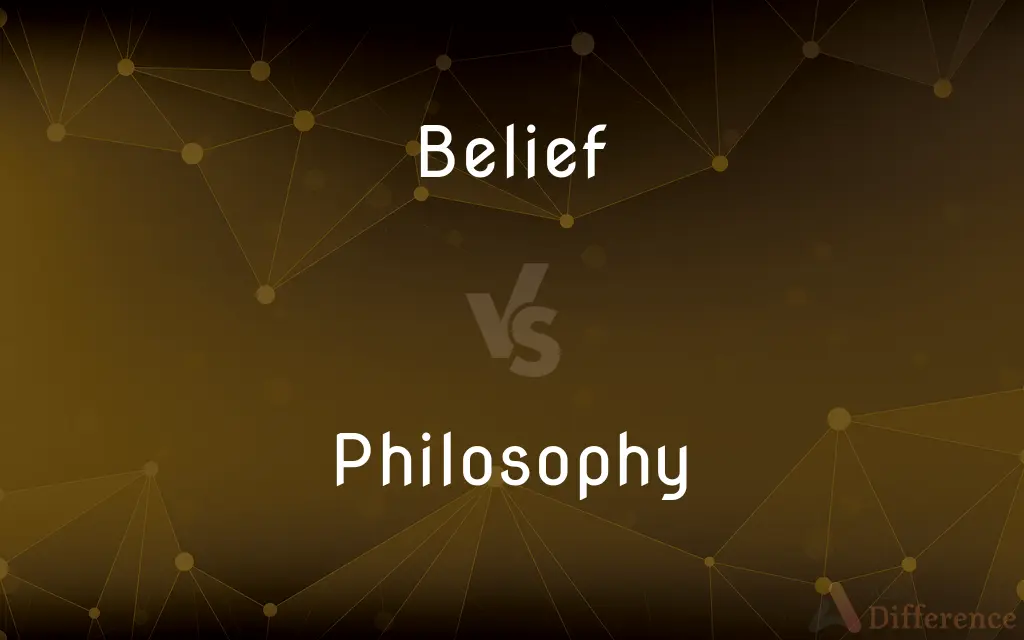Belief vs. Philosophy — What's the Difference?

Difference Between Belief and Philosophy
ADVERTISEMENT
Compare with Definitions
Belief
A belief is an attitude that something is the case, or that some proposition about the world is true. In epistemology, philosophers use the term "belief" to refer to attitudes about the world which can be either true or false.
Philosophy
Philosophy (from Greek: φιλοσοφία, philosophia, 'love of wisdom') is the study of general and fundamental questions, such as those about existence, reason, knowledge, values, mind, and language. Such questions are often posed as problems to be studied or resolved.
Belief
The mental act, condition, or habit of placing trust or confidence in another
My belief in you is as strong as ever.
Philosophy
The study of the fundamental nature of knowledge, reality, and existence, especially when considered as an academic discipline.
Belief
Mental acceptance of and conviction in the truth, actuality, or validity of something
His explanation of what happened defies belief.
ADVERTISEMENT
Philosophy
A theory or attitude that acts as a guiding principle for behaviour
Don't expect anything and you won't be disappointed, that's my philosophy
Belief
Something believed or accepted as true, especially a particular tenet or a body of tenets accepted by a group of persons.
Philosophy
The study of the nature, causes, or principles of reality, knowledge, or values, based on logical reasoning.
Belief
Mental acceptance of a claim as true.
It's my belief that the thief is somebody known to us.
Philosophy
A system of thought based on or involving such study
The philosophy of Hume.
Belief
Faith or trust in the reality of something; often based upon one's own reasoning, trust in a claim, desire of actuality, and/or evidence considered.
My belief is that there is a bear in the woods. Bill said he saw one.
Based on this data, it is our belief that X does not occur.
Philosophy
The study of the theoretical underpinnings of a particular field or discipline
The philosophy of history.
Belief
(countable) Something believed.
The ancient people have a belief in many deities.
Philosophy
An underlying theory or set of ideas relating to a particular field of activity or to life as a whole
An original philosophy of advertising.
An unusual philosophy of life.
Belief
(uncountable) The quality or state of believing.
My belief that it will rain tomorrow is strong.
Philosophy
The love of wisdom.
Belief
(uncountable) Religious faith.
She often said it was her belief that carried her through the hard times.
Philosophy
(uncountable) An academic discipline that seeks truth through reasoning rather than empiricism.
Philosophy is often divided into five major branches: logic, metaphysics, epistemology, ethics and aesthetics.
Belief
(in the plural) One's religious or moral convictions.
I can't do that. It's against my beliefs.
Philosophy
(countable) A comprehensive system of belief.
Belief
Assent to a proposition or affirmation, or the acceptance of a fact, opinion, or assertion as real or true, without immediate personal knowledge; reliance upon word or testimony; partial or full assurance without positive knowledge or absolute certainty; persuasion; conviction; confidence; as, belief of a witness; the belief of our senses.
Belief admits of all degrees, from the slightest suspicion to the fullest assurance.
Philosophy
(countable) A view or outlook regarding fundamental principles underlying some domain.
A philosophy of government;
A philosophy of education
Belief
A persuasion of the truths of religion; faith.
No man can attain [to] belief by the bare contemplation of heaven and earth.
Philosophy
(countable) A general principle (usually moral).
Belief
The thing believed; the object of belief.
Superstitious prophecies are not only the belief of fools, but the talk sometimes of wise men.
Philosophy
(archaic) A broader branch of (non-applied) science.
Belief
A tenet, or the body of tenets, held by the advocates of any class of views; doctrine; creed.
In the heat of persecution to which Christian belief was subject upon its first promulgation.
Philosophy
A calm and thoughtful demeanor; calmness of temper.
Belief
Any cognitive content held as true
Philosophy
Synonym of small pica.
Belief
A vague idea in which some confidence is placed;
His impression of her was favorable
What are your feelings about the crisis?
It strengthened my belief in his sincerity
I had a feeling that she was lying
Philosophy
To philosophize.
Philosophy
Literally, the love of, inducing the search after, wisdom; in actual usage, the knowledge of phenomena as explained by, and resolved into, causes and reasons, powers and laws.
Philosophy
A particular philosophical system or theory; the hypothesis by which particular phenomena are explained.
[Books] of Aristotle and his philosophie.
We shall in vain interpret their words by the notions of our philosophy and the doctrines in our school.
Philosophy
Practical wisdom; calmness of temper and judgment; equanimity; fortitude; stoicism; as, to meet misfortune with philosophy.
Then had he spent all his philosophy.
Philosophy
Reasoning; argumentation.
Of good and evil much they argued then, . . . Vain wisdom all, and false philosophy.
Philosophy
The course of sciences read in the schools.
Philosophy
A treatise on philosophy.
Philosophy
A belief (or system of beliefs) accepted as authoritative by some group or school
Philosophy
The rational investigation of questions about existence and knowledge and ethics
Philosophy
Any personal belief about how to live or how to deal with a situation;
Self-indulgence was his only philosophy
My father's philosophy of child-rearing was to let mother do it
Share Your Discovery

Previous Comparison
Irreality vs. Unreality
Next Comparison
Lac vs. Tac














































